
Techniques and Innovations in Gastrointestinal Endoscopy
Scope & Guideline
Innovating Techniques for Enhanced Patient Care
Introduction
Aims and Scopes
- Clinical Innovations in Endoscopy:
The journal emphasizes new techniques and methodologies in endoscopy, including advances in endoscopic suturing, myotomy, and stenting, aimed at enhancing patient outcomes and procedural efficacy. - Quality Improvement and Metrics:
A consistent focus on establishing and improving quality metrics for endoscopic procedures, such as adenoma detection rates and quality report cards, to ensure high standards in clinical practice. - Resource-Limited Settings:
The journal highlights the challenges and innovations in providing endoscopic care in resource-limited environments, fostering international collaboration and sharing insights from diverse healthcare settings. - Artificial Intelligence and Technology Integration:
A growing emphasis on the application of artificial intelligence and machine learning in endoscopy, focusing on improving diagnostic accuracy, procedural efficiency, and patient safety. - Patient-Centered Outcomes:
Research addressing patient perspectives on endoscopic therapies, including safety, satisfaction, and the impact of telemedicine, reflects the journal's commitment to patient-centered care. - Environmental Sustainability in Endoscopy:
The journal explores the ecological impact of endoscopic practices, promoting sustainability and innovative approaches to reduce the carbon footprint of gastrointestinal procedures.
Trending and Emerging
- Integration of Artificial Intelligence:
The use of artificial intelligence in endoscopy is rapidly expanding, with research focusing on its applications in diagnostics, procedural assistance, and quality metrics, indicating a trend towards technology-driven solutions. - Focus on Patient Safety and Outcomes:
An increasing emphasis on patient safety and outcomes, including studies on adverse events and patient-centered care, reflects a growing awareness of the importance of patient perspectives in endoscopic practices. - Sustainability and Environmental Impact:
The journal is increasingly addressing the environmental implications of endoscopic practices, promoting research on sustainability and the ecological footprint of gastrointestinal procedures. - Global Health and Resource-Limited Settings:
Emerging themes around the provision of endoscopic care in resource-limited settings highlight a commitment to addressing global health disparities and fostering international collaboration. - Advanced Endoscopic Techniques:
The trend towards innovative endoscopic techniques, such as endoscopic myotomy and advanced stenting methods, signifies a shift towards more complex and effective interventions in gastrointestinal care.
Declining or Waning
- Traditional Endoscopic Techniques:
As the field progresses with new technologies and methodologies, traditional endoscopic techniques have seen a relative decline in publication frequency, indicating a shift towards innovative approaches. - Generalized Endoscopic Procedures:
The journal appears to be moving away from broad, nonspecific studies in endoscopy, favoring more specialized and technique-driven research that addresses specific challenges and innovations. - Basic Endoscopy Training:
Research focusing on basic training and education in endoscopy seems to be less prevalent, potentially overshadowed by advanced training methodologies and competency-based education approaches. - Single-Specialty Endoscopic Practices:
There is a noticeable decrease in the publication of studies focused solely on single-specialty endoscopic practices, as the journal increasingly emphasizes interdisciplinary approaches and collaborations. - Descriptive Studies Without Technological Focus:
Descriptive studies that lack a technological or innovative component are becoming less frequent, as the journal prioritizes research that contributes to advancements in endoscopic techniques and patient care.
Similar Journals

Gastroenterology Report
Cutting-edge Insights for the Future of Gastrointestinal MedicineGastroenterology Report, published by Oxford University Press, is a leading Open Access journal dedicated to advancing the field of gastroenterology. Since its inception in 2013, this journal has become a vital resource for researchers, clinicians, and students, providing them with access to high-quality, peer-reviewed articles that span a wide range of topics in gastrointestinal health and disease. With an impressive Q2 ranking in gastroenterology and holding a position of #66 out of 167 in Scopus rankings, it reflects the growing impact and relevance of its published research. The objective of the Gastroenterology Report is to foster interdisciplinary collaboration and disseminate crucial findings that can improve patient outcomes and shape future studies. As the journal converges its efforts from 2014 to 2024, it continues to strengthen its role as a premier outlet for innovative research and clinical advances in the dynamic field of gastroenterology.

World Journal of Gastrointestinal Endoscopy
Elevating Standards through Rigorous ResearchWorld Journal of Gastrointestinal Endoscopy, an esteemed publication under the BAISHIDENG PUBLISHING GROUP INC, plays a pivotal role in advancing the field of gastroenterology through its dedicated focus on cutting-edge research and innovative practices in gastrointestinal endoscopy. With a commitment to facilitating the dissemination of knowledge, this journal seeks to provide a platform for researchers, clinicians, and academic professionals to share their findings and insights into the latest endoscopic techniques, technologies, and applications. The journal aims to foster collaboration and improve patient outcomes through rigorous peer-reviewed articles that encompass a broad range of topics within gastrointestinal endoscopy. With its impact on shaping clinical practices and influencing future research directions, the World Journal of Gastrointestinal Endoscopy is an essential resource for anyone in the field, remaining accessible through various academic channels, including institutional libraries and individual subscriptions.
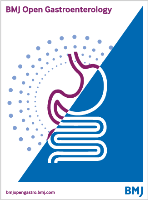
BMJ Open Gastroenterology
Elevating Patient Care with Open Access Gastroenterology ResearchBMJ Open Gastroenterology is a premier open access journal published by the esteemed BMJ Publishing Group, focusing on the dynamic and evolving field of gastroenterology. Established in 2014, the journal has rapidly ascended in stature, reflected in its impressive 2023 Q1 ranking in gastroenterology and its position within the top 25% of journals in the category according to Scopus. With a mission to disseminate high-quality, peer-reviewed research with global significance, the journal provides a vital platform for researchers, professionals, and students alike to share their findings and advancements in gastrointestinal medicine. Operating from its headquarters in London, England, the journal's open access format ensures wide visibility and accessibility of cutting-edge research, making it an invaluable resource for those dedicated to improving patient care and driving innovation in gastroenterological sciences. By engaging with this journal, contributors and readers can stay at the forefront of critical developments in the field, fostering a collaborative environment for knowledge exchange.
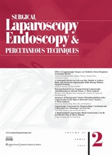
SURGICAL LAPAROSCOPY ENDOSCOPY & PERCUTANEOUS TECHNIQUES
Transforming Surgery Through Cutting-Edge ResearchSurgical Laparoscopy Endoscopy & Percutaneous Techniques is a highly regarded journal in the field of surgical innovation and technology, published by Lippincott Williams & Wilkins. This journal focuses on the latest advancements in minimally invasive surgical techniques, providing a platform for specialists to share their research and clinical experiences. With an impact factor reinforcing its significance, it is categorized in the Q2 tier within the broader field of Surgery, ranking #266 out of 551 in Scopus. The journal also has an extensive history, operating continuously since its inception in 1991 and maintaining relevance up to the present day. Researchers, professionals, and students alike can benefit from its rich content, which emphasizes the importance of innovation and collaboration in surgical practice. The journal’s commitment to disseminating crucial findings enhances its role as a vital resource in promoting advancements that ultimately improve patient outcomes.
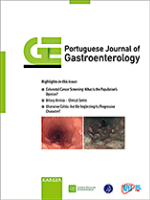
GE Portuguese Journal of Gastroenterology
Pioneering Open Access Research in GastroenterologyThe GE Portuguese Journal of Gastroenterology, published by KARGER, is a prominent platform in the field of gastroenterology, providing a vital forum for the dissemination of high-quality research since its establishment. With an open access model implemented in 2012, the journal ensures that emerging findings in gastrointestinal health are readily accessible to a global audience, facilitating the exchange of critical knowledge among researchers, practitioners, and students alike. Based in Switzerland, this journal has earned a respected position within the academic community, currently holding a Q3 ranking in the gastroenterology category for 2023, alongside a Scopus rank of #113 out of 167 in its field. Spanning converged years from 2014 to 2024, the GE Portuguese Journal of Gastroenterology aims to bridge gaps in research and practice, fostering collaboration and innovation across diverse areas within the discipline. Authors and readers alike benefit from the journal's commitment to advancing knowledge and practice in gastroenterology.
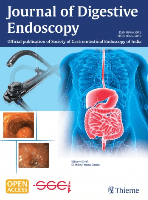
Journal of Digestive Endoscopy
Advancing the Frontiers of Digestive HealthJournal of Digestive Endoscopy is a premier academic journal published by THIEME MEDICAL PUBL INC, focusing on the rapid advancements and innovative techniques in the field of digestive endoscopy. Established as an Open Access platform since 2011, this journal aims to disseminate high-quality research, reviews, and clinical studies that contribute to the understanding and improvement of digestive health. Featuring a broad spectrum of topics ranging from diagnostic procedures to therapeutic interventions, the journal serves as an essential resource for researchers, clinicians, and students alike who seek to enhance patient outcomes and advance their knowledge in gastroenterology. With its commitment to accessibility and academic rigor, the Journal of Digestive Endoscopy plays a vital role in fostering collaboration and innovation within the scientific community.

DEN Open
Fostering a global dialogue in medical science.Welcome to DEN Open, a pioneering journal published by WILEY, dedicated to advancing the field of medicine through an open-access model. Established in 2021, this journal serves as a platform for innovative research in various medical disciplines, including surgery, gastroenterology, and internal medicine. With a focus on disseminating high-quality, peer-reviewed articles, DEN Open aims to foster collaboration and knowledge sharing among researchers, professionals, and students worldwide. Despite its early years, the journal has already established itself within the competitive landscape of medical publications, ranking in the 41st and 29th percentiles in its respective Scopus categories. This underscores its commitment to scientific rigor and impact within the realm of medicine. As we converge towards 2025, DEN Open invites submissions that contribute to the evolving dialogue in healthcare, enhancing the intersection of knowledge, practice, and patient care.

Lancet Gastroenterology & Hepatology
Pioneering research for better digestive health outcomes.Lancet Gastroenterology & Hepatology is an esteemed journal, published by ELSEVIER INC in the United Kingdom, dedicated to advancing the fields of gastroenterology and hepatology. Since its inception in 2016, this journal has quickly established itself as a leading platform for high-quality research, evidenced by its impressive rankings as Q1 in both Gastroenterology and Hepatology for 2023. With a Scopus rank of #2 out of 167 in Gastroenterology and #2 out of 82 in Hepatology, it lies in the prestigious 99th and 98th percentiles, respectively, underscoring its significant impact within the scientific community. The journal aims to publish original research, critical reviews, and clinical studies that illuminate the latest advancements and challenges in the understanding and treatment of gastrointestinal and liver diseases. As a vital resource for researchers, healthcare professionals, and students alike, the Lancet Gastroenterology & Hepatology journal fosters the dissemination of pioneering findings and facilitates informed discussions to enhance patient care and health outcomes globally.
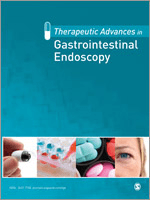
Therapeutic Advances in Gastrointestinal Endoscopy
Exploring Breakthroughs in Gastroenterological ResearchTherapeutic Advances in Gastrointestinal Endoscopy, published by SAGE Publications Ltd in the United Kingdom, is a cutting-edge Open Access journal dedicated to the field of gastroenterology and advancing the practice of endoscopy through rigorous research and clinical innovation. Since its establishment in 2019, the journal has become an invaluable resource for researchers, clinicians, and students, providing a platform for the dissemination of high-quality studies and novel therapeutic techniques. With an impressive Q2 ranking in the Gastroenterology category and a current Scopus rank of #63/167, it reflects the journal's commitment to fostering academic excellence and impactful research. The journal aims to enrich the field by sharing significant findings that improve patient outcomes and advance the knowledge of gastrointestinal procedures. The adoption of an Open Access model ensures that research is accessible to a global audience, thereby facilitating knowledge exchange and collaboration within the gastroenterology community.
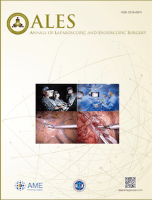
Annals of Laparoscopic and Endoscopic Surgery
Championing research that reshapes surgical methodologies.Annals of Laparoscopic and Endoscopic Surgery, published by AME Publishing Company, serves as a pivotal platform for advancing the field of surgical techniques and technologies. Established in 2019, this journal emphasizes research contributions that enhance the practice of laparoscopic and endoscopic surgery, fostering innovation and clinical excellence. With an Impact Factor that reflects its growing influence in the discipline, the journal holds a respectable Q3 ranking in the Surgery category and is ranked #307 out of 551 in the Scopus Medicine_Surgery sector, placing it in the 44th percentile. This is indicative of its commitment to precise, cutting-edge research and the global relevance of its content. Researchers, clinicians, and students alike will find invaluable insights and a wealth of knowledge within its pages, as it provides open access to a diverse range of articles aimed at improving patient outcomes and surgical methodologies. The journal is based in Shatin, Hong Kong, China, and continues to push the boundaries of surgical research through its dedicated publication efforts.